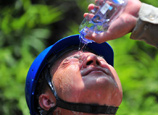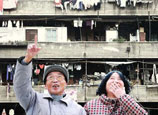
The four-in-one new model makes the rehabilitated “have job to engage, work to do, people for help and sites for medical care”
The Anti-Drug Law of the People’s Republic of China was enacted in June 2008. It clearly stipulates that drug abusers should be put into community-based drug treatment and rehabilitation, and proposes new concepts, new methods and new requirements in strengthening drug rehabilitation work through integrating “physical detoxification, psychosomatic recovery and social inclusion” into one task.
In actual practice, work in drug prevention, abstention and withdrawal is extremely hard due to three challenges namely treatment consolidation, control & supervision as well as social inclusion, leading to a high relapse rate. The vicious circle: drugs taking - compulsory treatment - relapse - another mandatory abstention and return, bothers and constraints not only Guizhou Province but also the whole world at large.
Solutions to this problem have puzzled the Party committees and governments at all levels for a long time. Guizhou focuses on the career development of the rehabilitated while insisting on the guideline of “forbidding planting, producing, trading and taking drugs”. The “Sunshine Project” mode centered on job placement initiated in Guizhou has realized a desired result to have the rehabilitated “have job to engage, work to do, people for help and sites for medical care”.
This model is originated from Duyun of Qiandongnan Miao and Dong Autonomous Prefecture. A “Loving Care Baseball Factory” was founded in early 2006 as a rehabilitation site integrated with three functions of voluntary rehabilitation, physical and mental recovery as well as social inclusion of the drug users. Totally 50 people were accommodated at its beginning. This is the prototype of Guizhou’s "Sunshine Project".
The rehabilitated were arranged to take paid jobs near the community and receive methadone treatment for free to kick the habit gradually, and eventually become accepted by the family and the public. Such a successful model was soon copied and spread to many places in Guizhou.
Meng Jianzhu, member of the State Council, director of the National Narcotics Control Commission, and Minister of Public Security, visited Guizhou on June 14 - 16, 2011. During this inspection, he made a special visit to “Sunshine Electronics Processing Plant” located at Yunyan District where he fully recognized the accomplishment of the “Sunshine Project”. He said that the original three-in-one rehabilitation mode became a four-in-one mode by adding Guizhou’s job placement initiatives; the sunshine production bases have done a great job in offering these people a platform to resume their self-cognition, dignity and confidence. That was a creative social administration trial deserving to be referred and promoted all over the country.
Guizhou Public Security Department delivered its report on the work of “Sunshine Project” for the deliberation and approval of the Standing Committee of Guizhou Provincial Party Committee and Executive Meetings of Guizhou Provincial Government on June 18. The then General Secretary of provincial Party committee Li Zhanshu, and Governor Zhao Kezhi made speeches, respectively, and decided to greatly boost the “Sunshine Project” in entire Guizhou province. Shortly after that, the Opinions of the Provincial People’ Government Office on Carrying out in-Depth Construction of the “Sunlight Project” for Drug Rehabilitation and Recovery (the Opinions) and a series of relevant documents were issued to include the “Sunshine Project” work into the duties of the provincial Party committee and provincial government to develop policy security mechanism.
As instructed by Minister Meng, the National Narcotics Control Committee convened an “On-the-spot Meeting on National Community-based Drug Treatment & Rehabilitation” in Guiyang on Nov. 29, to introduce the experience drawn from the “Sunshine Project”. Guizhou established a multi-mode and complementary job placement system for the rehabilitated in manner of concentrated distribution in “Sunshine Factories”, scattered in other enterprises in accompanying with governmental arrangement, self-employment and entrepreneurship, etc. by further enlarging the intension and extension of the project after the meeting.
By this July, Guizhou has built 86 concentrated job placement enterprises (bases) and offered more than 13,000 posts through multi channels. It is planned to complete 100 such job placement sites to achieve a full coverage in the province.
 |  |
















 China's Chongqing issues orange-coded alert of heat
China's Chongqing issues orange-coded alert of heat


![]()
